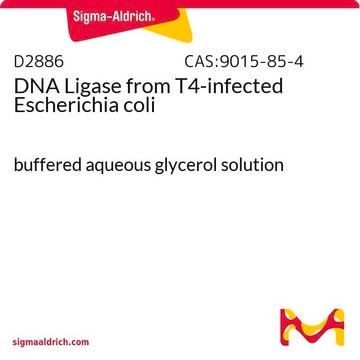70099-M
T4 DNA Polymerase, LIC-qualified - Novagen
Novagen′s T4 DNA Polymerase has been qualified for ligation-independent cloning using a unique assay to verify its performance.
Sinónimos:
T4 Polymerase
Iniciar sesiónpara Ver la Fijación de precios por contrato y de la organización
About This Item
UNSPSC Code:
12352202
NACRES:
NA.54
Productos recomendados
Quality Level
form
liquid
manufacturer/tradename
Novagen®
storage condition
OK to freeze
avoid repeated freeze/thaw cycles
technique(s)
molecular cloning: suitable
storage temp.
−20°C
General description
T4 DNA polymerase is a potent enzymatic tool used in the process of ligation-independent cloning (LIC), a technique that allows to insert DNA fragments into plasmid vectors without the need for traditional restriction enzyme digestion and ligation steps. The 3′ exonuclease activity of T4 DNA polymerase is used in the LIC process to create single-stranded overhangs on the DNA fragment, which can then anneal with complementary overhangs on the vector, allowing the fragment to be inserted. In the LIC process, T4 DNA polymerase, in conjunction with complementary primers designed to lack one of dATP, dTTP, dCTP, or dGTP for a sequence of 12–15 bp, is used to generate single-stranded complementary overhangs of a fixed length. This annealing technique can then be followed by transformation directly into E. coli, which repairs the nicked DNA backbone, resulting in the successful insertion of the DNA fragment into the vector
Application
T4 DNA Polymerase, LIC-qualified – Novagen has been used in the ligation-independent cloning (LIC) reaction to generate single-stranded 5′ termini overhangs on the DNA insert and destination plasmid vector.
Components
•250 UT4 DNA Polymerase, LIC-qualified
•500 µl10X T4DNA Polymerase Buffer
•500 µl10X T4DNA Polymerase Buffer
Warning
Toxicity: Standard Handling (A)
Legal Information
NOVAGEN is a registered trademark of Merck KGaA, Darmstadt, Germany
Storage Class
10 - Combustible liquids
wgk_germany
WGK 1
Certificados de análisis (COA)
Busque Certificados de análisis (COA) introduciendo el número de lote del producto. Los números de lote se encuentran en la etiqueta del producto después de las palabras «Lot» o «Batch»
¿Ya tiene este producto?
Encuentre la documentación para los productos que ha comprado recientemente en la Biblioteca de documentos.
Nuestro equipo de científicos tiene experiencia en todas las áreas de investigación: Ciencias de la vida, Ciencia de los materiales, Síntesis química, Cromatografía, Analítica y muchas otras.
Póngase en contacto con el Servicio técnico








